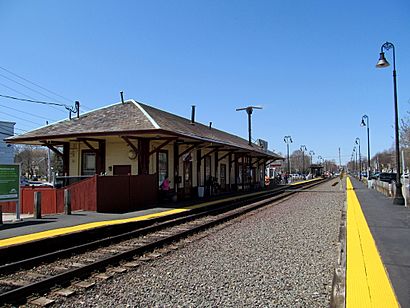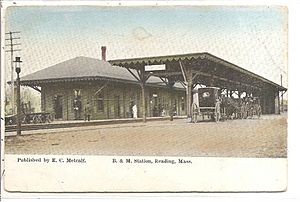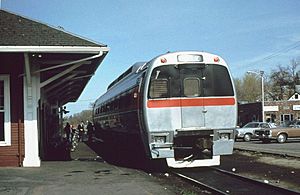Reading station (MBTA) facts for kids
Quick facts for kids
Reading
|
|||||||||||
|---|---|---|---|---|---|---|---|---|---|---|---|

Reading station viewed from the unused platform in 2014
|
|||||||||||
| Location | 35 Lincoln Street, Reading, Massachusetts | ||||||||||
| Coordinates | 42°31′18″N 71°6′27″W / 42.52167°N 71.10750°W | ||||||||||
| Owned by | MBTA | ||||||||||
| Line(s) | Western Route | ||||||||||
| Platforms | 2 side platforms | ||||||||||
| Tracks | 1 | ||||||||||
| Connections | |||||||||||
| Construction | |||||||||||
| Parking | Yes | ||||||||||
| Bicycle facilities | 10 spaces | ||||||||||
| Disabled access | Yes | ||||||||||
| Architectural style | Stick/Eastlake, Queen Anne | ||||||||||
| Other information | |||||||||||
| Fare zone | 2 | ||||||||||
| History | |||||||||||
| Opened | 1845 | ||||||||||
| Rebuilt | 1870 | ||||||||||
| Traffic | |||||||||||
| Passengers (2018) | 855 (weekday average boardings) | ||||||||||
| Services | |||||||||||
|
|||||||||||
|
Boston and Maine Railroad Depot
|
|||||||||||
| Lua error in Module:Location_map at line 420: attempt to index field 'wikibase' (a nil value). | |||||||||||
| Area | 3 acres (1.2 ha) | ||||||||||
| MPS | Reading MRA | ||||||||||
| NRHP reference No. | 84002509 | ||||||||||
| Added to NRHP | July 19, 1984 | ||||||||||
Reading station is a train stop in Reading, Massachusetts. It's part of the MBTA Commuter Rail system, serving the Haverhill/Reading Line. You can find it at Lincoln and High Streets, near the center of Reading.
The old station building was built in 1870 by the Boston and Maine Railroad company. For a while, from 1959 to 1979, Reading was the last stop on the line. Then, the train line was extended again to Haverhill.
Contents
The Station's History
The Boston and Maine Railroad built a train line from Wilmington Junction to Boston in 1845. Reading was one of the stops along the way. A new station building was constructed in 1870. This building is southwest of the tracks, where Lincoln and Prescott Streets meet.
What Does the Station Look Like?
The station building is long and rectangular. It has a style called Queen Anne. You can see special columns at the corners and between the sections. Large supports hold up the wide roof overhangs. The side facing the tracks has seven sections, with windows and doors. One window sticks out and has colorful glass at the top.
Changes Over Time
The town of Reading bought the station in 1960. For a short time, it was used as a museum about railroad history.
In 1973, the MBTA bought the Haverhill Line. They planned to replace the commuter trains with an extended Orange Line subway. This new subway line would have gone from Oak Grove to a new station near Route 128, outside downtown Reading. However, this subway extension was never built because it became too expensive. So, commuter train service continued on the line.
Modern Upgrades
Around 1991, the station was updated. A special ramp was added on the inbound side to make it easier for everyone to use the station. This is called a mini-high platform.
The second train track, which had been removed many years before, was not rebuilt. The platform on the outbound side was fixed, but it did not get a new mini-high platform. This means that trains going in both directions use the inbound platform. Even with this setup, Reading is still the last stop for some local trains on the line.
Historic Recognition
The Reading station building is important because of its history and design. It was added to the National Register of Historic Places in 1984. This is a list of places in the United States that are worth saving. In 1985, the town sold the building to private owners. They had to agree to protect its historic features.
 | William L. Dawson |
 | W. E. B. Du Bois |
 | Harry Belafonte |



